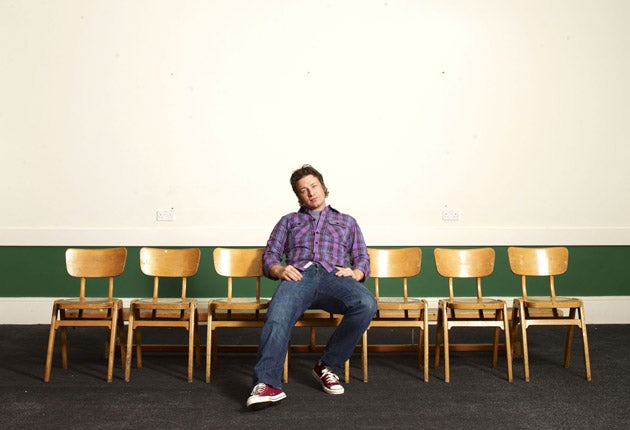Jamie's Dream School, Channel 4, Wednesday<br/>Attenborough and the Giant Egg, BBC2, Tuesday
Jamie Oliver's chums may be the alpha males of the media world, but naturals in the classroom they are not

Your support helps us to tell the story
From reproductive rights to climate change to Big Tech, The Independent is on the ground when the story is developing. Whether it's investigating the financials of Elon Musk's pro-Trump PAC or producing our latest documentary, 'The A Word', which shines a light on the American women fighting for reproductive rights, we know how important it is to parse out the facts from the messaging.
At such a critical moment in US history, we need reporters on the ground. Your donation allows us to keep sending journalists to speak to both sides of the story.
The Independent is trusted by Americans across the entire political spectrum. And unlike many other quality news outlets, we choose not to lock Americans out of our reporting and analysis with paywalls. We believe quality journalism should be available to everyone, paid for by those who can afford it.
Your support makes all the difference.Dismayed to learn that half of Britain's schoolchildren flunk their GCSEs, Jamie Oliver unveiled a new project: Jamie's Dream School.
An educational failure himself (two GCSEs, presumably in Domestic Science and Applied Lisping), he rounded up 20 fellow flunkers and bussed them into an empty school, there to be taught elementary history, English, art and science by a squad of public figures from a territory somewhere between the groves of academe and the palace of celebrity. "It's the great and the good vs the bored and the badly behaved," said Oliver in one of many pungent comments on his own experiment.
It quickly became apparent that both sides were slightly miscast. These kids weren't thick; they'd either been ignored or shouted at too much (like Angelique, who said, "How can I be 16 and still facing the wall?"), or accommodated too indulgently, like middle-class graffiti artist Henry. And the "dream teachers" may have been alpha males of stage and TV, but they sure weren't natural teachers.
Taking English was Simon Callow. Initially a confident, booming presence, he faltered under the hail of irrelevance that followed his questions about the Bard of Avon. Had the class heard of Stratford? "OhMiGod, I live, like, an hour away from Stratford," shrieked Angelique (from Romford). When he asked them to nominate a person they'd like to be, one black youth chose Katie Price. Callow blinked. He'd been expecting Nelson Mandela, or Barack Obama, or someone who corresponded to a Shakespearean hero; alas, there are few Bardic heroines whose importance lies in their breast implants.
Less happy outcomes followed the interventions of Robert Winston's science class, whose climactic dissection of a pig made some scholars vomit; of Rolf Harris's art class (he almost wept when he saw some canvases had been muddily shit-coloured and abandoned); and especially David Starkey, who stole the show. Beadily irascible, he began by telling the children, "You're here because you're failures," and within five minutes had upset a brooding sociopath called Conor by saying he was fat. Conor retaliated stoutly ("Are you a midget? How long you been that high?") but the damage was done. Jamie's headmaster friend John D'Abbro explained that, had Starkey been a teacher, he'd have been dismissed. "We'll have to help him," he and Jamie agreed, as though discussing a delinquent. "Or help him help himself."
Behind the programme's square-dance of co-operation and rejection lay a question. Had these kids really been "let down" by the education system? Or had they, as Starkey asked, "had too much of the milk of human kindness"? Getting to the root of their threadbare self-esteem is the real challenge for the naked educationalist.
In 1960, a boyishly keen zoologist called David Attenborough visited Madagascar for BBC1's Zoo Quest. Heedless of conservationist ethics, he collected species of animals, lizards and insects to ship to London Zoo – and also discovered some thick, white shards of a 3D jigsaw that became a giant egg. Half a century later, snow-haired, dishevelled and dismissive of his youthful anthropomorphism, Attenborough returned to the Indian Ocean to see what had become of the island and its fauna, and to try to work out what happened to the "Elephant Bird" which produced the super-egg.
Attenborough and the Giant Egg made for a bitty but fascinating documentary, hopping between 1960 and 2011, between forest lemurs, baobab trees, museum exhibits of giant bird skeletons (about which Attenborough was subtly sceptical, whispering to camera that the curators might have added a few vertebrae for effect) and the wasteland of deforestation. He gave a bravura exhibition of the things that have made him the god of zoological programming: the airy deductions about how creatures evolved, the vivid synecdoche ("this small, spiked object in my hand holds the secret of an entire species"), the respectful whispering in the presence of animals, the close encounters. When he offered a lemur some leaves for its lunch, the lemur accepted with shy delight, as though about to ask the great man for his autograph.
And the Elephant Bird whose remains he sought died out in AD700. It was killed off, not by climate change, or hunters, or deforestation, but because its eggs were nutritious and easy to steal. Rapacious Man, as usual, was the culprit. You could almost go off homo sapiens as a hopelessly nasty species, were they not so charmingly represented by Sir David.
Join our commenting forum
Join thought-provoking conversations, follow other Independent readers and see their replies
Comments